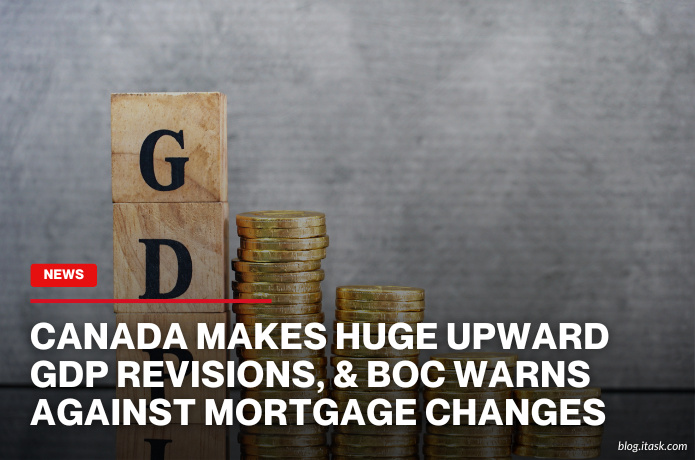Canada Makes Huge Upward GDP Revisions, & BoC Warns Against Mortgage Changes
Canada Makes Huge Upward GDP Revisions, & BoC Warns Against Mortgage Changes

Canada’s economic landscape saw a significant shift as Statistics Canada revised the country's GDP data upwards. The revisions revealed an economic output equivalent to an entire year had been overlooked between 2021 and 2023. This newfound economic strength has sparked debates on past policy decisions, with critics suggesting that tighter monetary policies might have been unnecessary based on previously underestimated data.
These revelations come alongside warnings from the Bank of Canada (BoC) against easing mortgage rules. While the country’s real estate market has cooled, the central bank cautions that relaxing mortgage stress tests or other lending criteria could reintroduce risks to financial stability. Such measures were initially introduced to prevent an overheated housing market and excessive household debt.
The GDP revisions have raised concerns about the accuracy of economic forecasting and policymaking. Some experts argue that incorrect data may have influenced past decisions, including interest rate hikes. This could mean Canada’s economy was more resilient during certain periods than previously thought, potentially altering the trajectory of key policies had this information been available earlier.
Canada's real estate market also remains a focal point. Despite lower housing demand and prices dropping over 30% in some areas, borrowing continues to rise. Mortgage debt now matches the country’s GDP, reflecting a precarious balance between financial vulnerability and economic recovery. The BoC’s warnings underline the risks of loosening rules in such a high-debt environment.
Critics argue that these developments highlight systemic challenges, including reliance on housing for economic growth. With nearly 15% of Canada’s GDP tied to real estate and related sectors, the country faces long-term risks if alternative growth drivers are not developed.
As Canada navigates these economic realities, policymakers must balance maintaining financial stability with fostering growth. The BoC’s cautionary stance on mortgage policies and the implications of the GDP revisions underscore the complexity of managing an economy amidst evolving data and external uncertainties.
